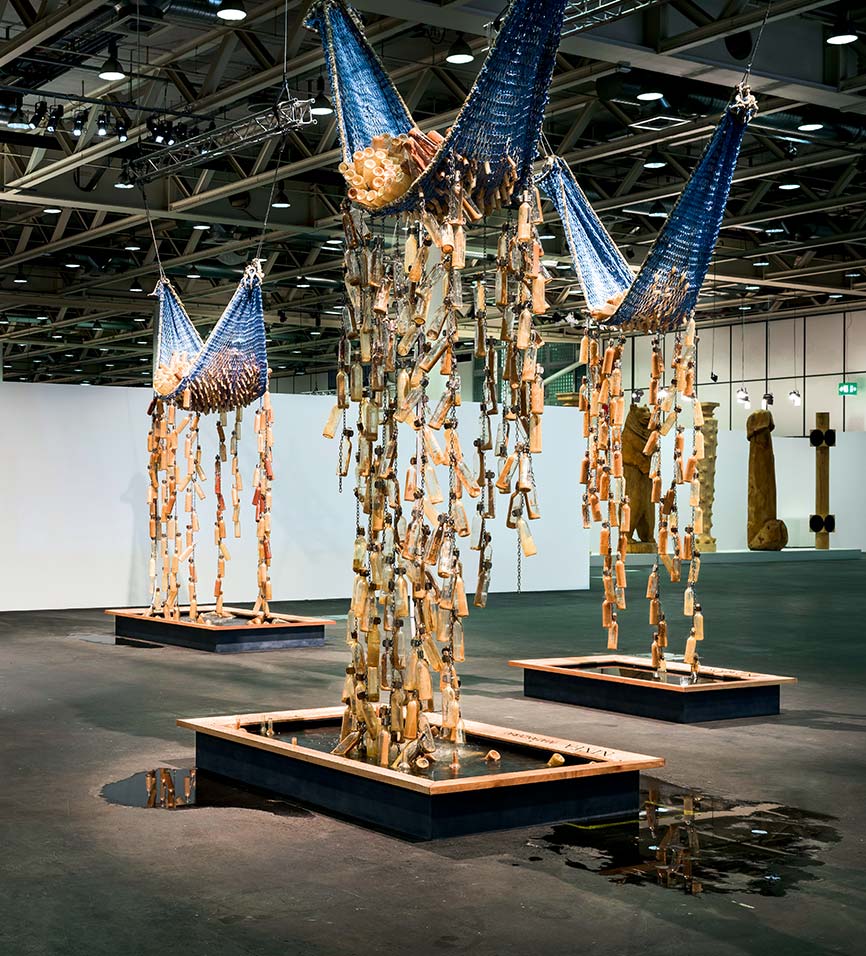Quite possibly the only event of its kind in this part of the world, the Kochi-Muziris Biennale is a prestigious contemporary art exhibition organised by the Kochi Biennale Foundation. A celebration of art and the biggest platform in South Asia for artists, this year the event has come into infamy, as it is shrouded in accusations of non-payment to workers and for exploiting them into providing free labour.
The Kochi Biennale Foundation is a not-for-profit, charitable trust, promoting art, cultural, and educational activities. The foundation which organised all four editions of the exhibition has been embroiled in controversies of non-payment to workers who built the pavilion at Cabral Yard in Kochi, which was one of the central locations of the event. The pavilion, known as the Knowledge Laboratory, was envisioned by curator Anita Dube, as the centrepiece of the exhibition. Apart from this, independent workers like masons, plumbers, and fabricators, have also come forward with allegations of non-payment.
The Instagram page, justicefrombiennale18_19 has been set up to document and bring to light the injustices committed by the foundation. In response to this, the Kochi Biennale Foundation called the IG page and its posts a ‘disinformation campaign.’ However, with regular posts and stories, the account has been fairly triumphant in bringing to the foreground the behind-the-scenes atrocities committed by the Kochi Biennale Foundation.
Issues arose a week into the commencement of the Kochi-Muziris Biennale. The foundation claimed that the price quoted was exorbitant. The Hindu reported that an organiser claimed that there was no proper work order, and the services of an independent, government-approved valuer were engaged, who allegedly quoted a lower price than the contractor.
At the forefront of this is the now legal struggle initiated by Mr Appu Thomas, director of Thomas Clery Infrastructures and Developers which was entrusted with almost the entire work for Biennale, and also oversaw the construction of the pavilion. On March 18, 2019, Mr Appu Thomas sent a legal notice to the foundation over non-payment of structural dues.
independent workers like masons, plumbers, and fabricators, have also come forward with allegations of non-payment.
Speaking to ART news, Mr Thomas said that the foundation paid all its overseas vendors and only local vendors have been facing these issues of non-payment. Claiming this to be a double-standard, he compared his work done for the Biennale to slavery.
Mr. Thomas’ Statement (Part 2/4)
Mr. Thomas’ Statement (Part 3/4)
Mr. Thomas’ Statement (Part 4/4)
In a series of videos posted on the Instagram account, Mr Thomas gives us a fairly detailed account of the fiasco. In a four-part video, he says that his firm was chosen and entrusted with working the entire event after years of being a regular contractor for the foundation and working on the last three editions of the exhibition. Working from October 1, 2018 to December 11 2018, his firm and the workers he hired did the entirety of the work in the Cabral Yard venue which housed the pavilion and almost all the work in the Aspinwall House in Fort Kochi, which included hanging up a 3.5-ton tyre to mount Eb Itso’s Developmental Mobility on.
Everything at Cabral Yard had to be created from scratch and the only money he was paid by the foundation was towards procurement of materials and items, and not towards payment of workers. He disputes the foundation’s allegations that the bills have been inflated and claims that every penny has been accounted for. Mr Thomas has paid the workers part of their dues the best he could do with the meagre amount he received from the Kochi Biennale Foundation. Urging the foundation to pay everyone their dues, Mr Thomas reminds them that this was real, hard work and not child’s
On March 23, 2019, the Kochi Biennale Foundation issued the following statement addressing the claims of non-payment.
In response to which, Justice From Biennale issued the following clarification.
We spoke to Mr Thomas for a first-hand narrative of the events that transpired. In speaking to FII, he said, “We (TCID / 184 labourers and 20 vendors) didn’t want to bring things to this, we are still open to a re-audit and a peaceful settlement. We have worked with the foundation in the past and have worked things out amicably, but this year, the arrogance and mismanagement have forced us to go public with the issue, because we stand to lose our livelihoods.”
“We have nothing against the Biennale, but we cannot let them destroy the livelihoods of hundreds.”
In discussing the claim of inflated costs made by the foundation, Mr Thomas said that due to the mismanagement of the Kochi Biennale Foundation, they were only allowed to work on-site for two months. Overtime put in by the workers, last-minute material procurement, and other issues raised due to the late commencement of the work, lead to the escalation of costs. Mr Thomas said, “We all believe this is an important event for Kerala, but we also believe this organisation is mishandling things without any concern for others.”
Also read: Workers Strike Nationwide Against Labour Law Reforms
He further added, “We have delivered the entirety of the work, both in Aspinwall and Cabral Yard to the satisfaction of the architect, curator, and the trustees. After using our facilities, products, and labour for three months, we are being told the price is exorbitant and that they cannot pay. There is no one for us to speak to and to rationalise with the Kochi Biennale Foundation. Though we requested an audit with the project architect and the drawings, numerous times, there has been no effort in this regard.”
The principal architect had warned the foundation of the escalation of cost arising due to the time constraints, says Mr Thomas. The venues were handed over to TCID only 60-days prior to the opening, forcing them to complete work that would take an estimated four months in half that time. “We have nothing against the Biennale,” says Mr.Thomas, “but we cannot let them destroy the livelihoods of hundreds.”
Numbers made available by Mr.Thomas show that out of a total sum of ₹29 million, only ₹17 million was received, with an outstanding payment of ₹12 million. Out of this ₹12 million, ₹7.7 million is owed to Thomas Clery Infrastructures and Developers.

A meeting between the contractors and workers has been set-up with the trustees for today, which Mr Thomas believes will be their best shot at persuading the board to sign-off on a fair re-audit.
In a move that further casts doubts upon the foundation’s integrity, the legal notice by the Kochi Biennale Foundation reeks of elitism. Denying all allegations against it, the foundation’s notice said that Mr.Thomas and those who sent the initial notice had “no right to comment or state on my client’s administrative capacity and fiscal prudence.” Furthermore, in an elitist display of unfounded superiority and cold indifference, the notice read, “the client (Thomas Clery Infrastructures and Developers) is akin to someone who erects tents, pandals and scaffoldings for household functions like weddings etc on payment. My client instructs that they had never entered into a contractual obligation with your client because as far as my client is concerned your client is only a small-time facilitator who arranges and erects hired infrastructure on demand and for payment.’
The dismissive indifference and utter apathy adopted by the Kochi Biennale Foundation and their revolting use of elitism to dismiss the allegations against them and disregard Mr Thomas’ claims by casting him, the vendors, and workers away as people that shouldn’t be heard just because they don’t enjoy the same privilege as the trustees, tells us a lot about the foundation and its callousness.
The notice further states, “My client also requests you to advise and remind your client (Mr. Thomas) that he is only a works facilitator, who has been entrusted with Biennale work and it is not within his rank or station to preach to the Trustees of KBF or to their representatives especially after enjoying their patronage.” The fact that the foundation adopted this elitist attitude as their defence is a testimony to their questionable integrity and their failing sense of justice.
Speaking of the Kochi Biennale Foundation’s blatantly elitist statements, Mr.Thomas said the following to FII, “This is the arrogance elitism, and disrespect we are met with during an edition that is supposedly focusing on inclusivity and marginalised voices.”
The fact that the foundation adopted this elitist attitude as their defence is a testimony to their questionable integrity and their failing sense of justice.
This display of privilege is certainly in contrast to the theme of the 2019 Kochi-Muziris Biennale, which incidentally was – Possibilities For A Non-Alienated Life.
The notice sent to the Kochi Biennale Foundation by Mr Thomas and his lawyers claims that by declining to pay the dues, the foundation is, “eroding the values that the Biennale as an event has always stood for.” A statement that is full of truth.
Art alone doesn’t make the Biennale. Without workers who translate the ideas envisioned by the organisers into reality, the Kochi-Muziris Biennale would never grow to be this prestigious event, enjoying international fame that it has come to be. For these workers to be deprived of what is owed to them is a failure that undermines the very essence of the event and everything it holds precious and promotes.
Also read: Why Women Workers Are Protesting Against H&M
The Biennale ends tomorrow after a rather triumphant three-month run, but any success the event sees won’t be genuine unless it addresses the issues affecting the team that made it a possibility
Follow justicefrombiennale18_19 on Instagram for timely updates on the issue.
Featured Image Source: GQ India
About the author(s)




